Background in conventional Learning Themes
- Observations and direct instructions are crucial in learning.
- Experiences in life shape our characters.
- Human character is shaped by personal experiences.
- Outcomes or consequences facilitate the process of learning.
- For example, punishment brings about correction in behavior (Boyce 33).
- Studying animals creates the best comparison to human life.
- Motor reproduction is not compulsory for learning to take place.
Albert Bandura is behind the Social Learning Theory. It entails aspects of conventional learning theory.
In addition, the theory incorporates B.F. Skinner’s operant conditioning theory. The theory heavily inclines towards the conventional learning themes especially among children.
The process of earning or acquiring knowledge requires individual cognition according to Albert Bandura. In addition, either direct instruction or observation may be used to pass knowledge from one individual to another. This implies that direct reinforcement or motor reproduction are not mandatory in the learning process so long as instructions and or observations are employed.
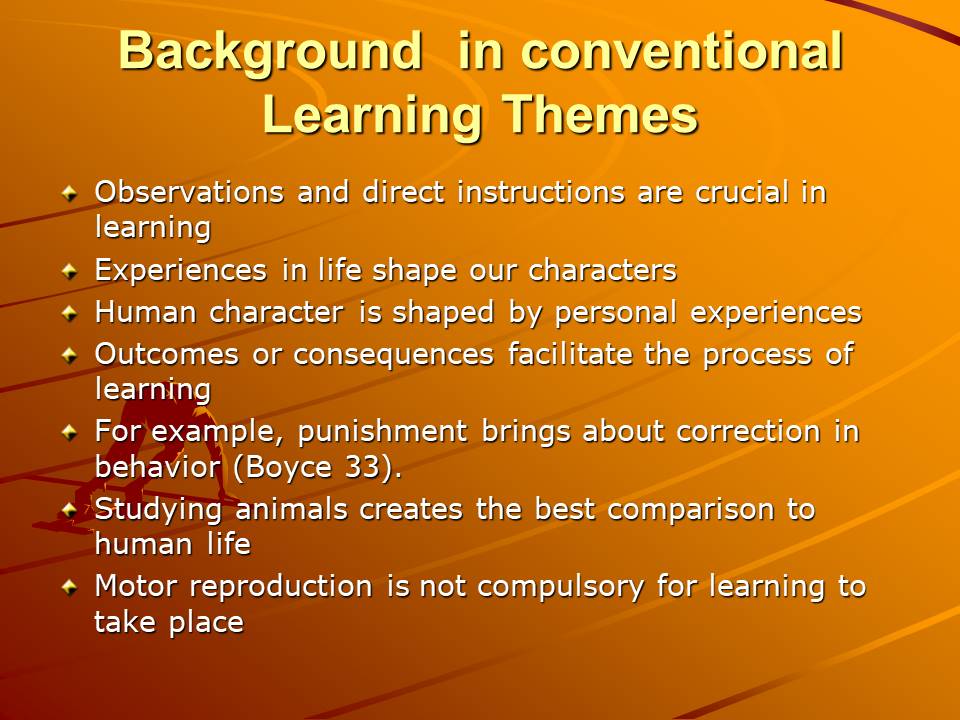
Behaviorism
Operant Conditioning by B.F Skinner
- It is also known as instrumental learning.
- This is the most critical way of approaching learning theories.
- Individual behaviors are conditioned through punishments and rewards.
- Scientific emphasis is given more attention in this scope (Miller 29).
- Replicable observation is the meaningful factor considered under this approach.
- Particular behaviors are linked to certain outcomes.
- Behavior may alter itself in different forms, strengths and frequency.
- B.F. Skinner popularized “respondent behavior” and “operant behavior”.
Behaviorism points out that direct enforcement may assist in enhancing the process of learning. According to B.F. Skinner, the mind can be conditioned or compelled to learn new concepts.
For example, new behaviors and concepts can be learned when rewards and punishments are put in place.
A reinforcing stimulus usually follows an Operant behavior.
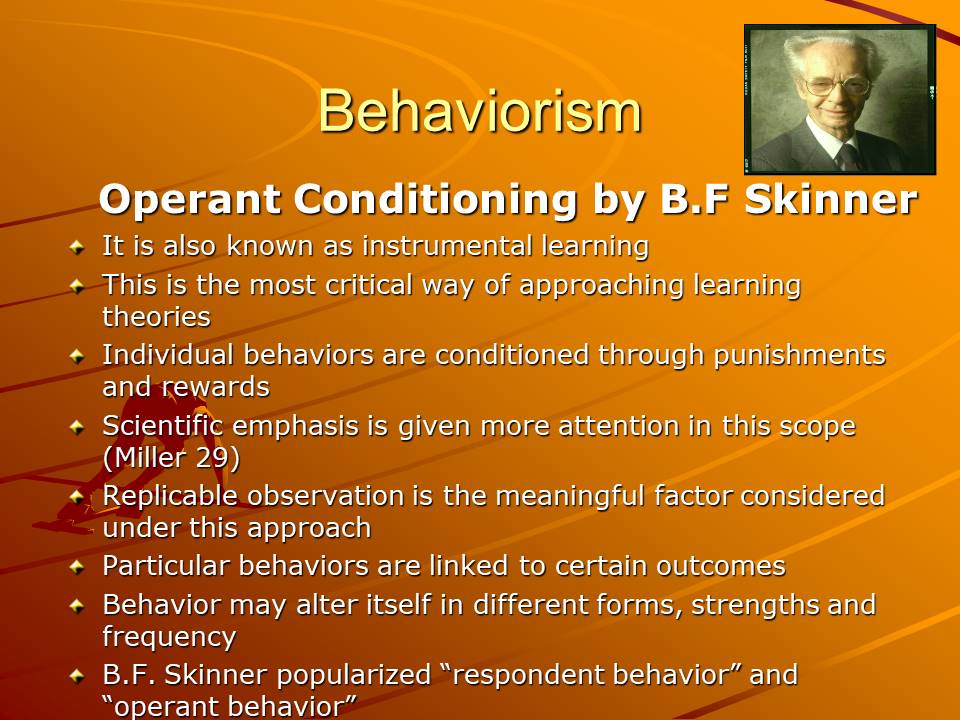
Behaviorists perception of the Brain
It is apparent that the human brain works like that of a rat in several respects. Both a rat and human being learn by paying attention as demonstrated in the illustrations above. This relationship has been expounded by the Social Cognitive Theory. Social learning takes place in the brain according to recent discoveries in neuroscience.
The neurophysiological basis of this theory are best explained using mirror neutrons especially in human beings.
However, primates also portray the same features because they belong to the same group as humans.
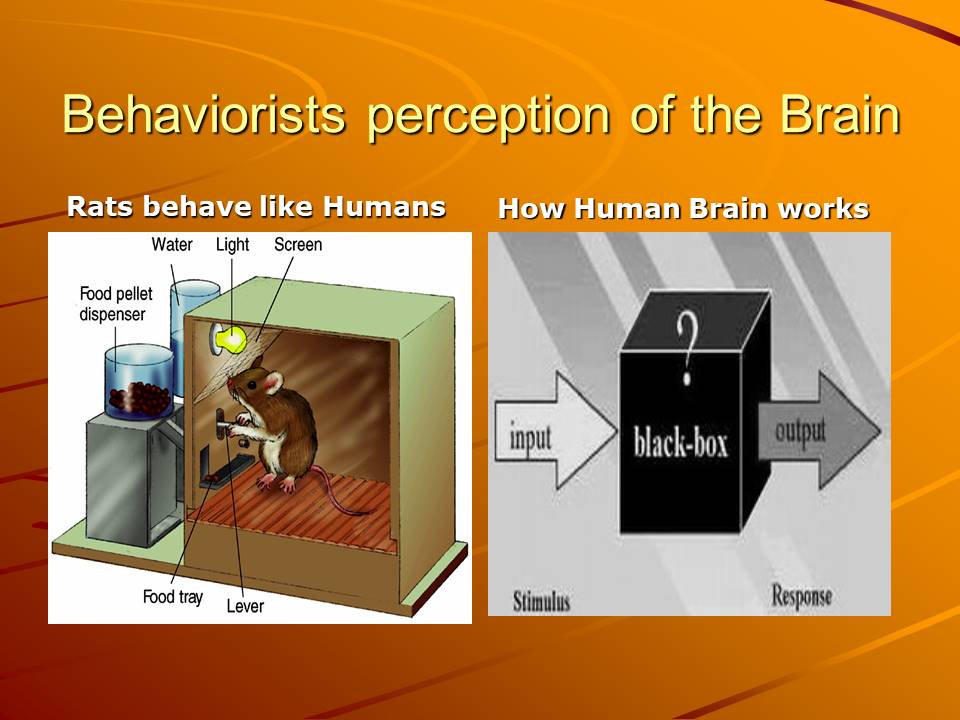
Retention and Social Learning Theory
- New behaviors must be learned.
- It is necessary to retain the new behavior (Boyce 31).
- Learning cannot take place without retention.
- Learning comes after attention and retention of behavior.
- A model is observed during the attention phase.
Retention is part and parcel of the modeling process according to the social learning theory. Once a model has been observed, it is necessary to store and memorize the information whenever required. Learners who fail to pass basic tests are said to have a poor retention ability.
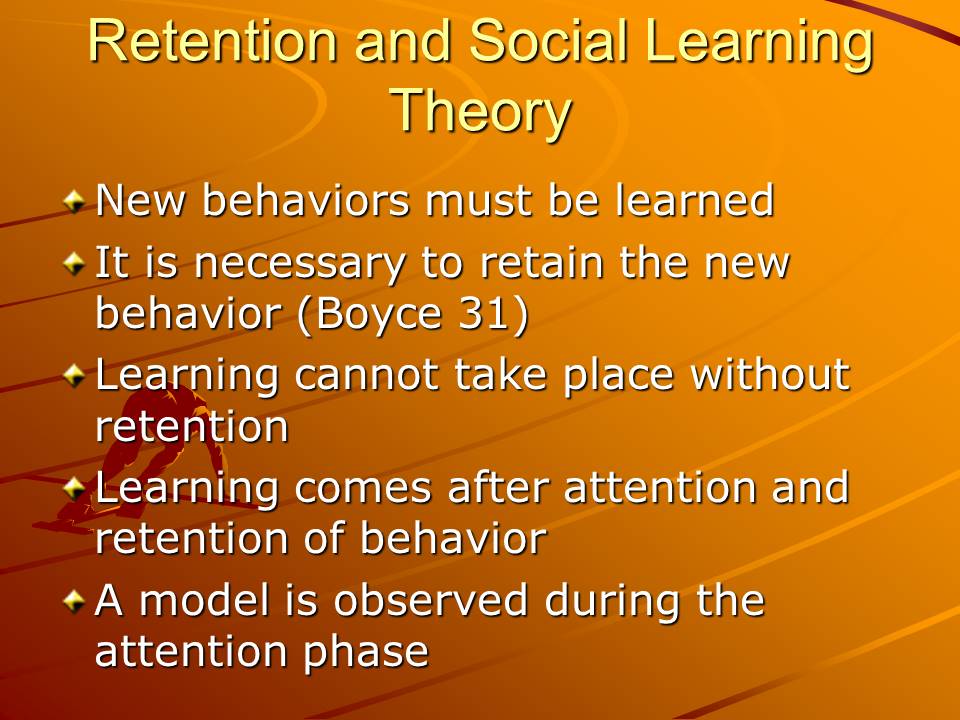
Reproduction
- According to Albert Bandura, behavior should be demonstrated.
- The above occurs after successful attention and retention phases.
- The retained information should be relevant (Boyce 33).
- Responses must be thoroughly organized.
- Previous performance, cognitive ability, and physical ability affect reproduction.
This phase of learning demands behavioral demonstration.
Unless a particular behavior is continuously repeated, it can be cumbersome to perfect it.
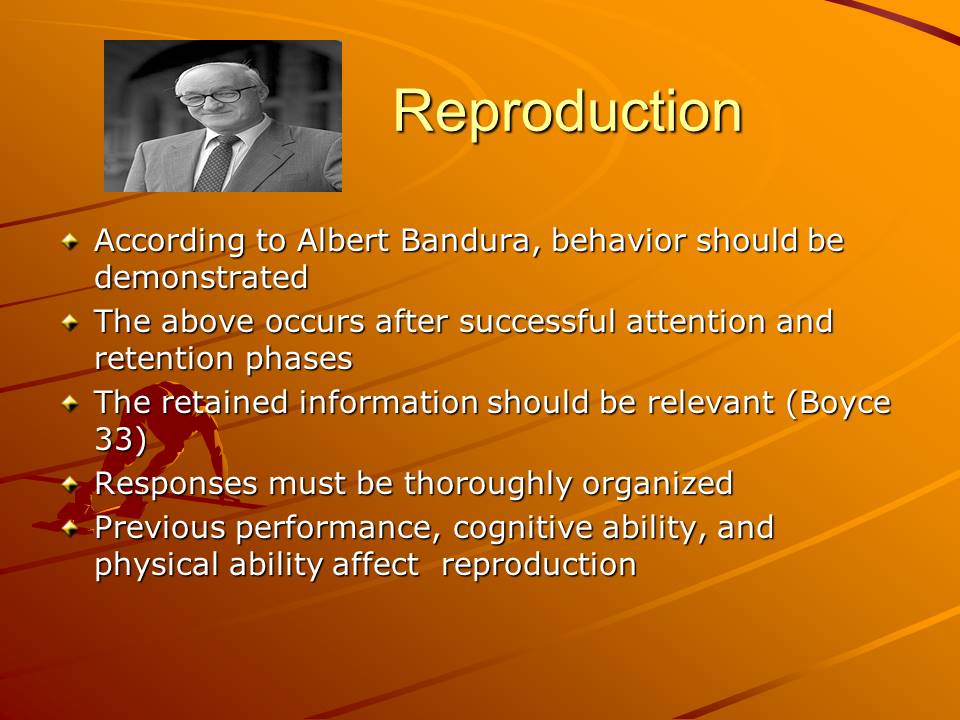
Forms of Social Learning Theory
In the Pure Modeling version, penalties and awards are not advanced to any individual.
In the Vicarious Learning form, awards and penalties are given to some individuals within the perspective of the learner.
Observing a behavior or its effects may facilitate the process of learning.
The pure modeling version attempts to explain how role models affect our behaviors. This explains why no one is punished or rewarded.
In the second version, punishments and rewards are deemed to be necessary.
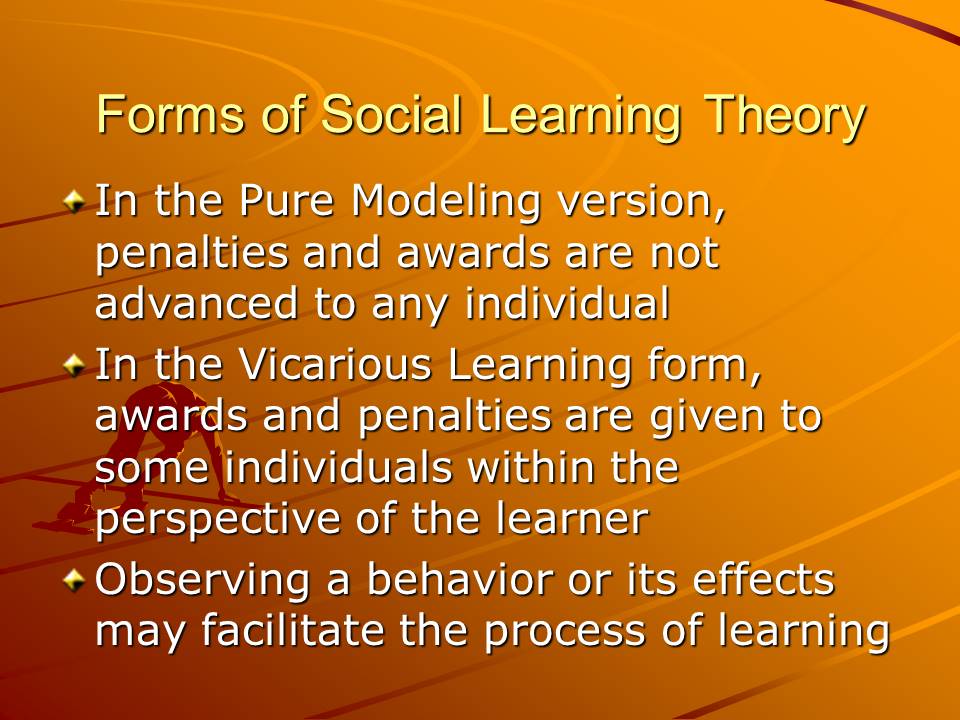
Setbacks of social Learning Theory
- It is narrow and offers scanty information about an individual.
- Excessively concentrates on situations (Miller 83).
- Biological factors are not put into consideration.
- It lacks free will owing to its mechanical nature.
Although this theory focuses more on situations than individuals, it still expounds the underlying factors that enhance social learning.
For example, knowledge must be acquired, retained and transmitted later for it to be useful.
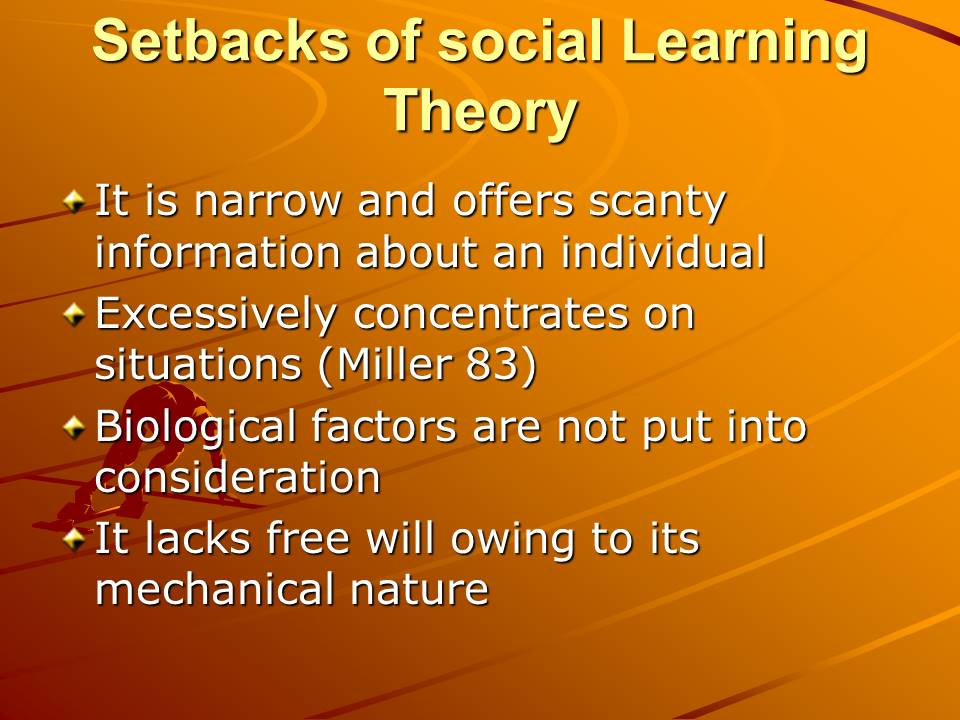
Motivation
- Motivation is necessary in order to enhance performance.
- Repeating a particular behavior perfectly arises from motivation.
- Motivated individuals can be bettter performers (Deeming and Johnson 206).
- Rewards are given for impressive performance.
- Punishments are preferred for inappropriate behaviors.
Motivation and performance are closely related to each other.
Social learning theory asserts that some people perform best when they are motivated.
however, this does not refute the fact that self-motivation also yields positive results in regards to performance.
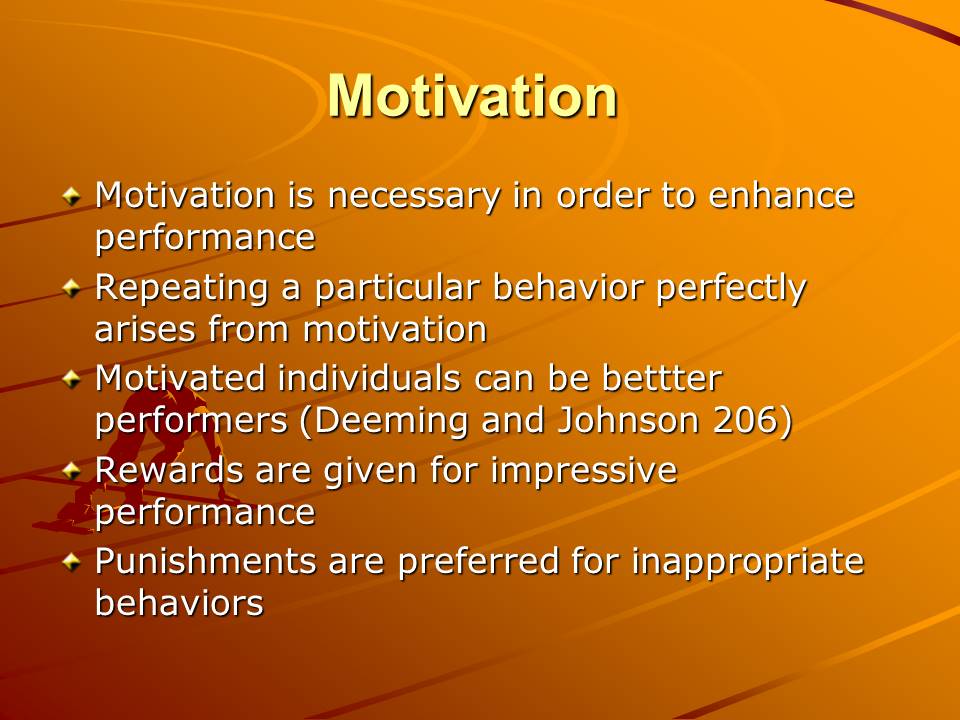
Free will and Determinism
- Scientific laws describe all forms of human behaviors according to determinism.
- However, free will is best explained using Humanistic theories.
- In order to learn a scientific formula, free will does not count.
Determinism tends to incline towards the in ability of human beings to control their behaviors. Some scientists argue that nobody should be accountable for wrong actions.
In regards to free will, people are controlled by personal desires and have the freedom to act in nay particular way so long as their actions are not detrimental to others or immediate surrounding.

Observational Learning
- It is possible to learn through observation.
- Watch other individuals perform a task and emulate the same.
- Children mostly learn through imitation (Miller 67).
- Bandura carried out several experiments with the Bobo Doll to illustrate learning throug observations.
One of the best ways of effective learning among children is observation.
In most cases, children emulate people around them, including their peers.
According to Bandura, adults are also easily influenced through observation when they acquire knowledge through social learning.
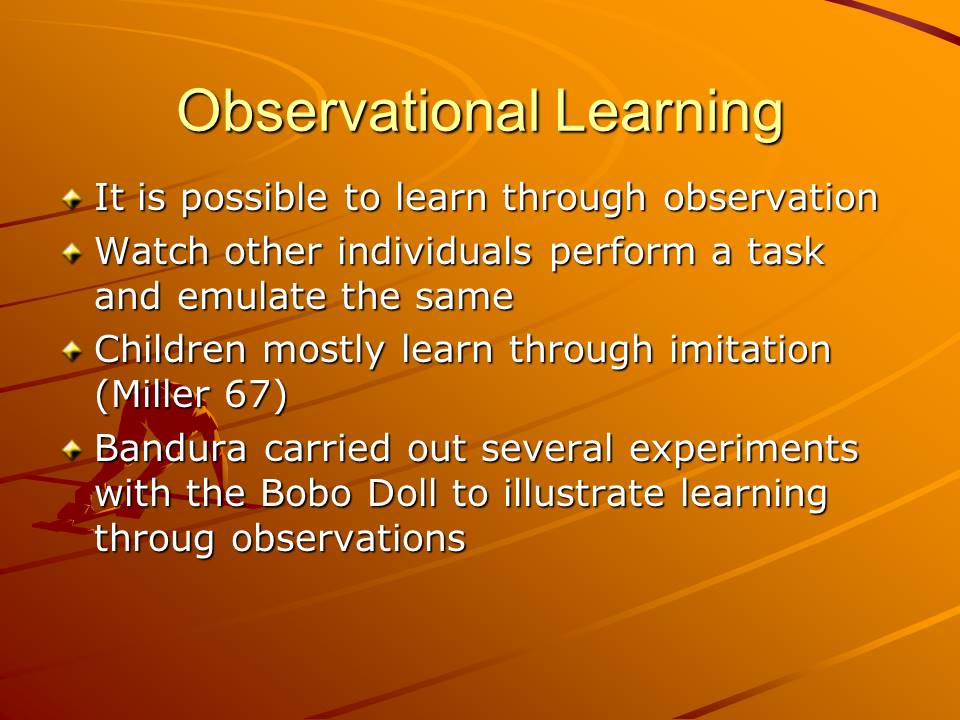
References
Boyce, Thomas E. “Applying Social Learning Theory.”Training Journal (2011): 31-34. Print.
Deeming, Paul, and Laurie Lee Johnson. “An Application Of Bandura’s Social Learning Theory: A New Approach To Deafblind Support Groups.”Journal Of The American Deafness & Rehabilitation Association (2009): 203-209. Print.
Miller, Patricia. 2011. Theories of developmental psychology. New York: Worth Publishers. Print.